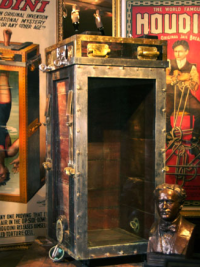Help us get to over 8,755 articles in 2024.
If you know of a magician not listed in MagicPedia, start a New Biography for them. Contact us at magicpediahelp@gmail.com
Water Torture Cell
Water Torture Cell was an escape developed by Harry Houdini that followed his Giant Milk Can Escape, which was beginning to have a vast number of imitators. He began to perform it during his fall tour with the Circus Busch in Germany in 1912, calling it simple "The Upside Down".
In this escape, Houdini's feet would be locked in stocks, and he would be lowered upside down into a tank filled with water. The mahogany and metal cell featured a glass front, through which audiences could clearly see Houdini. The stocks would be locked to the top of the cell, and a curtain would conceal his escape. In the earliest version of the Torture Cell, a metal cage was lowered into the cell, and Houdini was enclosed inside that. While making the escape more difficult (the cage prevented Houdini from turning), the cage bars also offered protection should the front glass break.
A committee of volunteers was chosen prior to the show to examine the tank. Houdini would be hauled upward, turned upside down and lowered down into the water. Assistants would locked the top of the tank and push a canopy over it to cover the top. Houdini was visible through the plate glass on the front of the tank until the drapes around it were closed. Assistants stood by with axes; ready to break the glass in case of emergency. After several suspenseful minutes passed, Houdini would escape and emerge through the curtains usually to a show-stopping applause.
The original cell was built in England, where Houdini first performed the escape for an audience of one person as part of a one-act play he called "Houdini Upside Down". This was so he could copyright the effect and have grounds to sue imitators (which he did). While the escape was advertised as "The Chinese Water Torture Cell" or "The Water Torture Cell", Houdini always referred to it as "the Upside Down" or "USD". The first public performance of the USD was at the Circus Busch in Berlin, on September 21, 1912. Houdini continued to perform the escape until his death in 1926. Despite two Hollywood movies depicting Houdini dying in the Torture Cell, the escape had nothing to do with his demise.
Modern interpretations
Several magicians and escape artists have performed the escape since Houdini, among them Al Marks (1940s, using a steel tank with no window), Dill-Russel and Norman Bigelow.
In the 1950s, magician Leo Irby performed the escape for "You Asked for It."
In 1975 magician Doug Henning performed a version of the Water Torture Cell during his first live television special on NBC. In his version, a twist ending revealed the magician to be one of the hooded ax-wielding assistants standing beside the cell.
In the Spring of 1980, magician John R. Hall (stage name Keoni - pronounced key-OH-nee) purchased a Chinese Water Torture Cell from Tony Spina of Louis Tannen (a magicians' supply company in New York City) and performed the escape on the television show PM Magazine in October 1980 ... and in other venues throughout 1980 and 1981. The Chinese Water Torture Cell purchased by Keoni was represented by Louis Tannen as a duplicate of the cell constructed for Doug Henning's live television broadcast on NBC. Like Doug Henning's performance, Keoni's escape ended with a twist, when the curtain around the cell was lowered, the cell was empty and Keoni retook the stage by running from the back of the theaters, down the aisles, to the stage.
Escape artist Steve Baker performed the Water Torture Cell for many years, including a performance on Dick Clark's LIVE Wednesday.
Escape artist Kristen Johnson performs a water cell escape that was inspired by Houdini's escape. Johnson's stunt is significantly different in that she remains in full view of the audience throughout the escape. She has performed this stunt well over 550 times to date and is known in the industry as doing a legitimate three minute plus breath hold in the water torture cell. Johnson has performed her version at NBA half time shows and has been seen on ESPN's SportsCenter.
Different versions of the device have been featured in Houdini biography fims, such as "Houdini" (Paramount, 1953), "The Great Houdinis" (1976) and the Turner TV-movie, "Houdini."
A simple, 'headfirst dive' version was depicted in the film, "The Escape Artist."
A similar, but simpler, immersion escape is featured in the 2006 movie The Prestige.
In 2006 actor Orlando Seale did a version of a water torture cell for the TV show Ghost Whisperer, on the episode named Miss Fortune. Mark Cannon was the Underwater Escape Consultant.
